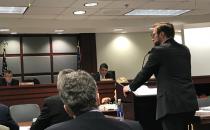SELC seeks to bring backdoor Vogtle dealings to light
Georgia groups have filed a joint motion to uncover additional evidence of behind-closed-doors discussions between Georgia Power and some of the Georgia Public Service Commissioners in the days leading up to the commission’s decision to continue the vastly over-budget Plant Vogtle nuclear expansion project. Under the commission’s own rules, such secret communications are not permitted after the close of public hearings.
The motion requests limited discovery regarding the communications between the Public Service Commissioners and Georgia Power Company, and that evidence of those communications be presented in court.
This filing is the latest step in the groups’ appeal of the Public Service Commission’s decision to approve continued construction of additional nuclear reactors at Georgia Power’s Plant Vogtle despite billions of dollars in cost overruns. The recent motion was filed in Fulton County Superior Court with SELC representing Partnership for Southern Equity and Georgia Interfaith Power and Light, and the Barnes Law Group, LLC representing Georgia Watch. The motion charges that the approval violates state law and the commission’s own rules concerning “ex parte” communications, which covers interactions such as private discussions between commissioners and any one of the parties involved.
The purpose of the ex parte rule is to restore and maintain the public’s confidence that decisions made by the commission on ratepayers’ behalf are fair and based on what is said in an open and public hearing room, not on messages exchanged secretly behind closed doors.
Adopted by the commission in 2007, the procedural rule forbids the commissioners and their staff to meet privately with any party once evidentiary hearings on a matter conclude. If any such meetings do occur, the commission—or the party that engaged in ex parte communications—must give all other parties to the proceeding notice of the communications and an opportunity to respond.
We don’t know the extent and substance of those conversations and, as a result, cannot know how seriously they may have impacted the commission’s final decision,” said SELC Senior Attorney Kurt Ebersbach. “Simply knowing that conversations took place isn’t enough—we need to know if those one-sided communications are what produced the lopsided result favoring Georgia Power at the expense of its customers.
Parties challenging the Vogtle expansion received several indications that improper communications occurred, including from statements commissioners made after the proceedings. In media coverage following the decision, one commissioner was quoted saying that,
while he did not want to get into details about his interaction with Georgia Power over the conditions contained in his motion, ‘Ultimately, they were read in and gave feedback.
Another indication was Georgia Power attorneys’ on-the-spot acceptance of the commission’s lengthy revised order, made without consulting their clients. A motion with such substantive changes usually requires thorough review by attorneys and clients. Instead, the modified agreement was immediately accepted when presented.
Sign-in records for the commission offices support this assertion, showing correlations between when commission decisions were made or advanced and when Georgia Power representatives were in the offices.
The joint motion filed in the case further details the numerous indications of inappropriate ex parte communications, communications that appear to financially benefit Georgia Power while increasing costs for customers.


